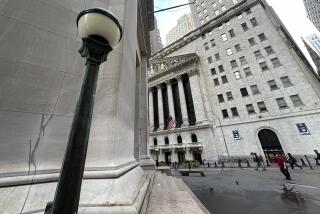Stock bulls betting on foreign lift
Wall Street stabilized Monday after last week’s rout, but the market’s ability to get back on -- and stay on -- a bullish path may depend on help from abroad.
Among big investors, many who are optimistic about U.S. stocks are betting that economic strength overseas will be a significant buffer against the domestic housing sector’s woes and tighter credit.
“The trump here is international growth,” said Michael Holland, head of New York-based money manager Holland & Co., which oversees about $4 billion. “If I’m in the U.S. mortgage market, I’m in trouble. If I’m selling to foreign customers I’m not.”
Although faith in foreign growth has been a popular investment theme for the last year or two, it has taken on more importance as worries about the domestic economy’s outlook have risen.
Strength in stocks of U.S. multinational companies could be crucial to maintaining confidence on Wall Street, because those shares often are the core of individual as well as institutional investors’ portfolios.
The Standard & Poor’s 500 index of large-company stocks rebounded 1% on Monday after diving 4.9% last week. Of 10 major industry sectors in the S&P;, commodity producers and industrial companies led the day’s advance. Both have been popular sectors this year with investors seeking to cash in on booming foreign economies.
Keith Wirtz, chief investment officer at Fifth Third Asset Management in Cincinnati, said he stayed mostly on the sidelines Thursday and Friday as the market plummeted. But he said any decline in U.S. multinational stocks just made them more attractive for his $22-billion fund, because of his expectations for overseas growth.
“We remain in the bull camp,” said Wirtz, who predicted the S&P; 500 would rise to 1,600 by year’s end, which would be an 8.5% gain from its level Monday.
Aerospace is one sector high on Fifth Third’s list, Wirtz said.
“We love Boeing,” he said, noting the company’s report last week that a surge in foreign plane orders helped boost second-quarter earnings well above analysts’ estimates.
Boeing shares hit a record $107.23 on Wednesday, then slid to $103.71 by Friday. The stock rose $1.83 to $105.54 on Monday.
Despite broad-based declines in share prices last week triggered by more bad news on the housing sector and by rising financing costs for corporate takeovers, industries that are key beneficiaries of foreign growth are holding on to substantial gains.
Energy stocks comprise the best-performing sector in the S&P; 500 index, up 18.2% this year. The commodities sector (also called materials) is No. 2, up 13.9%. Third is industrial stocks, up 12.3%.
The S&P; index overall is up 3.9%.
Robust foreign sales have underpinned second-quarter profit growth at many major companies, including IBM Corp., PepsiCo Inc. and Rockwell Automation Inc.
What’s more, second-quarter economic data are reinforcing many investors’ preference for companies that can tap foreign demand to keep their earnings rising.
The U.S. economy grew at a healthy 3.4% annualized rate last quarter, the Commerce Department said Friday. But consumer spending -- the mainstay of the economy -- was weak. It was offset in part by record exports.
Early today, Japan said its unemployment rate hit a nine-year low of 3.7% in June, while in Australia a new survey of business expectations showed the highest level of optimism since the quarterly survey began in 1989.
On Monday, France said its jobless rate fell to a 25-year low of 8% in June.
U.S. companies operating abroad have gained by selling more overseas this year. They’ve also benefited from the dollar’s weakness against most other currencies: As foreign currencies strengthen, U.S. companies’ overseas earnings are worth more in dollars.
The weak dollar also makes U.S. assets cheaper for foreign buyers.
South Korean industrial company Doosan Infracore on Monday said it would pay $4.9 billion for three divisions of industrial equipment maker Ingersoll-Rand Co. The offer was above Wall Street’s expectations, and drove Ingersoll-Rand shares up $3.63 to $51.77.
But some investors say it may be dangerous to assume that optimism about economic growth abroad will be enough to overcome fears about the domestic economy and put stocks back on an upward path soon.
David Kotok, chief investment officer of money manager Cumberland Advisors in Vineland, N.J., said his firm had 20% of its $900 million in assets in cash, and that he was in no hurry to add to stock holdings.
“The market is in a very dangerous zone for the next 60 to 90 days,” Kotok said. He cited the risk to the financial system from the credit crunch that began in the mortgage sector and has since spread to junk corporate bonds and other dicey debt.
Investors may be right to be hopeful about the global economy, Kotok said, but the situation at home is scary, in his view. “The financial sector is wounded,” he said, and he believes that’s increasing the threats to the economy and coloring investors’ perception of all securities.
“It’s impossible to say at this point how this will work out,” he said. “And when you don’t know, you wait.”
--
(BEGIN TEXT OF INFOBOX)
Sector leaders, laggards
Optimism about global economic growth has sharply boosted the energy, materials and industrial stock sectors in the Standard & Poor’s 500 index this year. By contrast, financial services stocks have been slammed on worries about tightening credit in the U.S.
S&P; sectors, year-to-date change
Energy: +18.2%
Materials: +13.9%
Industrials: +12.3%
Telecom: +10.8%
Technology: +10.4%
Utilities: +3.3%
Consumer staples: +2.1%
Healthcare: +1.4%
Consumer discretionary: -2.1%
Financial services: -8.1%
S&P; 500: +3.9%
--
Source: Bloomberg News
More to Read
Inside the business of entertainment
The Wide Shot brings you news, analysis and insights on everything from streaming wars to production — and what it all means for the future.
You may occasionally receive promotional content from the Los Angeles Times.










